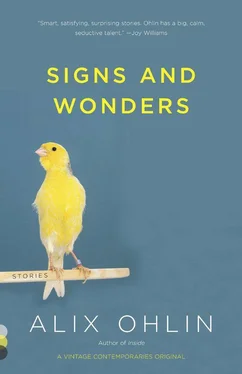Alix Ohlin - Signs and Wonders
Здесь есть возможность читать онлайн «Alix Ohlin - Signs and Wonders» весь текст электронной книги совершенно бесплатно (целиком полную версию без сокращений). В некоторых случаях можно слушать аудио, скачать через торрент в формате fb2 и присутствует краткое содержание. Год выпуска: 2012, ISBN: 2012, Издательство: Random House, Inc., Жанр: Современная проза, на английском языке. Описание произведения, (предисловие) а так же отзывы посетителей доступны на портале библиотеки ЛибКат.
- Название:Signs and Wonders
- Автор:
- Издательство:Random House, Inc.
- Жанр:
- Год:2012
- ISBN:9780307948649
- Рейтинг книги:3 / 5. Голосов: 1
-
Избранное:Добавить в избранное
- Отзывы:
-
Ваша оценка:
- 60
- 1
- 2
- 3
- 4
- 5
Signs and Wonders: краткое содержание, описание и аннотация
Предлагаем к чтению аннотацию, описание, краткое содержание или предисловие (зависит от того, что написал сам автор книги «Signs and Wonders»). Если вы не нашли необходимую информацию о книге — напишите в комментариях, мы постараемся отыскать её.
Signs and Wonders — читать онлайн бесплатно полную книгу (весь текст) целиком
Ниже представлен текст книги, разбитый по страницам. Система сохранения места последней прочитанной страницы, позволяет с удобством читать онлайн бесплатно книгу «Signs and Wonders», без необходимости каждый раз заново искать на чём Вы остановились. Поставьте закладку, и сможете в любой момент перейти на страницу, на которой закончили чтение.
Интервал:
Закладка:
The next day, when we showed up for work, the office was locked. We each got a letter with a severance check from the nonprofit that ran the magazine. I was puzzled but Sarah was irate; she kept talking about breaking into the office and writing to the authors. “There’s a proper way of doing things,” she kept saying, “and this most certainly is not it.” I’d never heard her say things like proper and most certainly. When I suggested maybe we should just move on, she turned on me like I was a traitor. “Don’t you care?” she said.
“Of course I do,” I said, but I could tell she didn’t believe me.
We attended Eric’s funeral together, at a pretty church in the West Village. He seemed to have no family but tons of friends, and they told stories about him as a young man, funny, romantic, and reckless: how he accepted a dare to swim in the East River at midnight, and almost drowned; how he tried to bribe Susan Sontag to publish in the magazine by bringing osso buco to her apartment. He never married, and the magazine seemed to have been his greatest love. Sarah and I nudged each other when we spotted writers we recognized. We didn’t talk to anybody. We were the youngest people there, and nobody knew who we were.
After that, we scrambled to find new jobs. With my supposed sales experience, I found a position in market research, and Sarah was hired by a glossy women’s magazine. Within a year she was promoted. I remember her calling me from her office, a rare occurrence by that point.
“Guess what I’m doing,” she said.
“Why are you whispering?”
“I’m about to have a meeting,” she said. “With my assistant. ”
We were on the other side. I got promoted too, and though I didn’t have an assistant I had what felt like a real salary, and I left my closet-sized bedroom and rented a studio in Park Slope. Sarah and I were both working long hours, and didn’t have much time to hang out. We never saw Millie at all. Sarah moved to L.A. for a few years to help launch a new magazine, then returned to New York. As a market analyst, I drifted away from the media world that consumed Sarah’s time, and we rarely crossed paths. She and I would make plans to get together, but it was hard to schedule around our jobs and families. Our arrangements kept falling through. Finally we were able to catch up over lunch, at a garden café near her apartment on the Upper West Side. She was the editorial director of a multimedia company; she asked me about my work and smiled politely through the answer. We showed each other pictures of our children, her five-year-old daughter and my twin boys.
Over coffee she said, “By the way, did you hear that Martin Horst died?”
I set my cup down. Though it was summer and we were eating outside, I felt cold. “No,” I said. “When?”
“A couple months ago.”
“What happened?”
“Unclear. There were prescription drugs involved. He had a bad back and some other health problems. Maybe it was an accident, maybe it was an OD? Nobody seems to know for sure.”
“This was in New York?”
“No, in South Carolina. He’d been back home for quite a while, I think.”
“How did you hear about this?”
“The usual. Friends forwarding e-mails. Facebook.”
“Martin was on Facebook?”
“No, but Millie is, and she heard about it from his ex-wife. I guess they were friendly. She’s an art dealer or something and Millie knows her.”
“I didn’t know.”
“I should’ve guessed something was up. Martin used to send all these funny group e-mails, especially during the election, he was really worked up about that, but then he went pretty quiet.”
For some reason my fingers were trembling. Learning that Martin was dead — he would’ve been forty, maybe forty-five? — was part of it. To think of his dying, to think of the pain that must have accompanied it, made my stomach hurt. But I was also shaken to learn that Sarah had been in touch with him, and with Millie, who’d been in touch with an ex-wife I hadn’t even known existed. A web I was no longer part of.
Across the table, Sarah squinted as the afternoon sun hit her face. “Oh dear,” she said. “You have that look on your face all over again.”
“What look?”
“I’m sorry,” she said. “I know he broke your heart.”
I wasn’t sure what she was talking about. When I thought back on that time, I didn’t register any heartbreak. I did recall Martin, vividly: his hunched shoulders; his attentive, watery eyes; and his disappearance, a loose thread unraveling a world I was just beginning to know. But I could barely picture the person I’d been back then, probably because I was vague even to myself. I hadn’t become anybody yet.
Sarah put on her sunglasses. She’d paid the bill, and now she stood up.
“Remember when he licked Millie’s knee that time?” I said.
“No,” she said. “I don’t think I was there.”
Bruno

The kid came out of the airport security area with his face turned to the windows, scuttling sideways like a crab. He was wearing skinny dark jeans and a red plaid shirt too hot for summer, and his dyed black hair jetted down over his eyes in an aggressive point. Inès had said, “He looks like a dirty little bird you would see in Buenos Aires or somewhere like that. Don’t worry, you will recognize him.” It was typical of her, this description: fanciful, excessive, weirdly accurate. He knew right away that this was his boy.
“Bruno,” he called.
The boy gave a minimal nod, came through the exit, and kissed Art on both cheeks. “ Salut, Papa,” he said.
“Welcome to New York.”
Bruno said nothing. As they waited at the baggage carousel, Art asked how the flight was, if he was hungry or thirsty, and received three shrugs in return. So he gave up. Silence accompanied them through the taxi line, and on the ride to Brooklyn. The boy’s eyes were trained out the window as the city came closer, his white earbuds firmly implanted. Though it had only been a few years since they’d seen each other, he seemed a stranger. Between twelve and fifteen was a lifetime, Art knew, but the last time he’d visited Bruno was still a child, and they’d strolled through the fields around Inès’s country house in Provence holding hands, he was amazed to remember. They’d played catch and wrestled. For a couple of summers he’d been too sick to make his yearly trip, and now his son was a teenager with an eyebrow ring. Inès had said he was having trouble in school, alluding vaguely to the wrong kind of friends. Maybe you help him on the straight road, she’d written in her e-mail, another unidiomatic phrase that made perfect sense.
They were almost at his apartment when the boy started nodding and singing along to whatever music was on his iPod. “Hey, baby, you gonna get with me, I show you what to do with that perfect ass. I slap you, I tap you—”
Art poked him and gestured for him to take the earbuds out. “We’re almost home.”
The boy nodded, taking in the brownstones, the trees, the stores. “It’s good, this place,” he said sweetly. “I’m glad I come live with you.”
“Sure,” Art said nervously. He and Inès had only discussed a three-week visit. But he didn’t say anything to his son, who he now noticed had flecks of sleep in his eyes. Bruno rubbed them with his fists, the gesture rendering him again the child of Art’s memory. He got Bruno inside, gave him a sandwich and a glass of milk, and put him to bed on the futon in his office. Then he took his laptop into the living room and e-mailed Inès: Wanted to let you know that he got here safely. He said something about coming here “to live.” He means for the month, right? Just checking that we’re all on the same page.
Читать дальшеИнтервал:
Закладка:
Похожие книги на «Signs and Wonders»
Представляем Вашему вниманию похожие книги на «Signs and Wonders» списком для выбора. Мы отобрали схожую по названию и смыслу литературу в надежде предоставить читателям больше вариантов отыскать новые, интересные, ещё непрочитанные произведения.
Обсуждение, отзывы о книге «Signs and Wonders» и просто собственные мнения читателей. Оставьте ваши комментарии, напишите, что Вы думаете о произведении, его смысле или главных героях. Укажите что конкретно понравилось, а что нет, и почему Вы так считаете.












